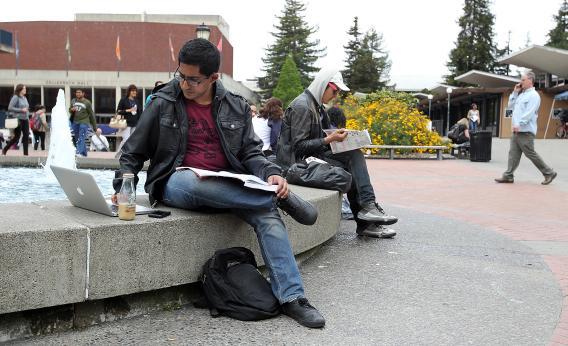Are you itching to harangue some entitled, unscrupulous kids for downloading and disseminating copyrighted content? Are you unsure where to start? TorrentFreak has published a provocative list of the 50 torrentingest college campuses in the country. These are the schools that register the most activity on BitTorrent networks, the P2P file sharing tools that allow users to freely stream material from various web sources at the same time. Torrenting is a tried and true (and mostly illegal) method for accessing online movies, music and games. So if you missed your chance to call out Generation Y during the Emily White scandal, you can still collar some students at Rutgers, New York University, the University of Houston, the University of Southern California, or Texas A&M University—the top five most torrenting colleges in the United States.
Peruse TorrentFreak’s chart, and you’ll see the name of each college paired with the absolute number of hits to a torrenting network that were then traced back to that college’s IP address. TorrentFreak used a technology called ScanEye to monitor a sampling of public torrent files—hundreds of thousands of them—and to track these files’ movement across the Web. (Note that the chart cannot encompass every hit, only the ones picked up by ScanEye.) But what exactly do these numbers communicate? I spoke to Ernesto (the pseudonym for Lennart Renkema, founder of TorrentFreak) about how we should interpret his data. Ernesto cautioned that the number of hits tracked back to a college’s IP address tells us nothing about how many students are actually using torrenting sites: Theoretically, for example, the figure for Rutgers could arise from 1,809 one-off music pirates, or from one devoted streamer revisiting BitTorrent 1,809 times. He also pointed out that not every university registers its IP address in its own name, although he’s checked the major ones and feels confident that his numbers reflect a sizeable slice of U.S. academia. Also worth mentioning: Many of the files on BitTorrent can be swapped and shared legally, so every hit on the chart does not necessarily denote a scofflaw. That said, Ernesto writes, “a quick glimpse at the most downloaded content reveals that unauthorized sharing is relatively popular.”
One factor that may affect the hit list is whether the university employs a firewall to stymie would-be pirates. On a tally that includes more than half of the D.C. area schools, for instance, American University is conspicuously absent: Could their Eaglesecure filtering system help explain the discrepancy? We also wondered about student population. Obviously, it would make more sense for colleges with more computer users to log more torrenting hits. So we compared TorrentFreak’s numbers to each school’s enrollment data to craft our own top 10 ballot.
